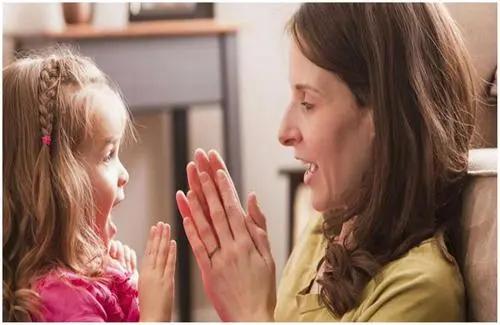Parents Should Know : How Do Babies Learn Languages?
More than 800 years ago, there was a Roman emperor named Frederick II. Although he was erudite and talented, he was very arrogant. He stubbornly believed that even if no one spoke to infants, they would learn language naturally, and in their country's language.

To prove this idea, he did a famous experiment:
Several newborn babies were taken to the care of nurses, who were allowed to breastfeed and wash the babies, but were not allowed to talk to the babies or even touch them much.
The final result can be imagined, Frederick II's experiment failed completely, none of the children learned to speak, and even they all died.
Children can communicate in a babbling way, with a sound that does not belong to their country.
Although this experiment is absurd, it further proves that babies cannot learn to speak without the input of external language; and if babies are not touched and cared for by their parents, even if they have food, it is difficult for them to grow up healthy.
Therefore, in the 3 years after the child is born, although the child can say few words, their language system is established. Brain scientists and linguists have also discovered that language learning may begin as early as before birth.
The scientists also have a study conclusion that may be more known. They investigated the differences in the vocabulary of children in different living environments and found that the vocabulary mastered by children of different classes varied considerably. Parents who talked to their children more often before age 3 had children who were smarter, had better grades and were more successful in the future.
Therefore, when the baby croaks, the brain is ready, and the golden window period of language learning begins.
Infants' Language Learning Is Divided Into The Following Stages:
1. Four Months
A baby's brain responds to every sound in any language. The brain is ready to learn any language or languages it can pick up.
2. Six Months
A baby's brain begins to favor a certain language it hears often, and its ability to distinguish each sound decreases slightly.
3. Ten Months
Babies can recognize and pronounce sounds in their own language, and their attention to sounds in other languages decreases.
3. Twelve Months
Babies can identify important words in their native language, as well as the differences between different words and sounds.
From 12 months to 3 years old, it is the window period of a child's language ability, the vocabulary that he can master increases rapidly, and the child's exposure to multiple languages at this stage is very helpful for him to master bilingual or even multiple languages in the future.
4. Four Years Old
The basic language ability of four-year-old children has been roughly formed. If a child does not have the opportunity to learn any language before the age of four, then, even if he can make up for it later, he will not be able to learn as efficiently as he did before the age of four.
5. Ten Years Old
By the age of ten, most of the connections of language cells in the human brain have been completed. Learning a language after the age of ten becomes difficult. While we can start learning a language at any point in life, learning it as an adult can take a huge amount of effort.
By understanding the laws of brain development and grasping the fleeting "window period", you can get twice the result with half the effort and lay a good foundation for children's future language development.
So, What Are The Best Ways To Help Infants And Toddlers Learn Language?
1. Talk To Your Baby
Talk to your baby, not show them TV or an app.
Experiments have found that babies need human contact and relationships before they start paying attention and learning. They are less likely to learn a language if they are only allowed to watch or listen to programs or sounds on electronic devices, without actually interacting and listening with people.
Parents try to find time every day to talk and chat with their babies. They can use more vocabulary and increase the quality of language input to promote the development of babies' language abilities.
2. Sing

Singing to your baby is a smart way to help them learn a language, and music can relax the brain and make learning enjoyable.
3. Read Picture Books And Tell Stories
One of the advantages of parent-child reading is that it can enrich the language input. Compared with daily chat, reading picture books to the baby will use more vocabulary, and develop the baby's imagination with the help of story scenarios.
Babies like to hear highs and lows, even some exaggerated and dramatic sounds, which will form more stimulation to the brain and help them identify different sounds. When parents tell a story, they can substitute characters and simulate the voices of characters and animals in the story to attract babies.
These three methods can also be applied to foreign language learning. During infancy, if babies have the opportunity to immerse themselves in two or more languages, they can learn it without worrying about confusion.
Of course, the mastery of each language is directly proportional to the amount of input they can receive.
Language proficiency is the foundation for children to learn other subjects in the future. Starting early can benefit a lifetime. Parents get along with their children more, talk, sing, and tell stories, which can raise a happy, healthy and intelligent child, and can also establish a more intimate relationship between the parent-child relationship.
Post a Comment for "Parents Should Know : How Do Babies Learn Languages?"